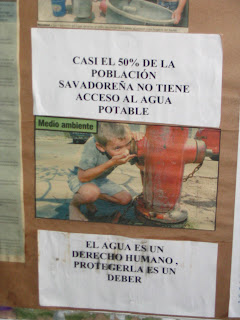We next visited UNES. They are focusing on ecological projects, specifically water. We visited their community projects too, but we started with a discussion with Dago Gutierrez. Their legal counsel, writer and poet. We spent a wonderful morning with him, he is a true philosopher.
He started by reflecting on time as a resource. When do the poor have time to reflect, to talk, to read to think? They only have time to exist. Time itself is a political issue – the poor have no time to live, the rich have the time to build and to destroy. When we reflect on time, we need to see that all things are connected in a great circle. When the circle no longer repeats itself in the great cycle of time we find ourselves in danger, we are finished.
He spoke about other conflicts we find in this day. There is the conflict between the market and nature. We have to distinguish what has a price – that is the market, and what has clear value; that belongs to nature. We run into trouble when we place a price on what we need to live – water has great value because it sustains life. Now we want to place a price on what is freely given by nature.
If water is a right that means that access to the resource must be universal. It cannot be turned into a commodity. Who protects these rights? This is the job of the state. The state is the only entity that can protect public rights. Now however, we have a conflict. There is now a struggle between the public and private realms. Today the market regulates the state. This is contrary to the great political tradition of Locke, Montesque and Bonaparte where the state was the champion of the citizens’ rights.
Water is now a source of conflict. Dago talked about huge resources of water stored in Paraguay
Dago also spoke about the dominance of the money class. In United States and Canada El Salvador El Salvador
There is much of Gustavo Gutierrez in what Dago spoke about. In the Open Veins of Latin America, Gutierrez speaks about the tradition of exploitation that stretches back to the Spanish conquest. Dago continues the narrative of Open Veins.
Dago finished by telling us that, “a pessimist is an optimist well informed.” We were assured that we are on the right path and that there is a close connection between Development and Peace and the activists of El Salvador
 |
| posters from UNES office in San Salvador |




No comments:
Post a Comment